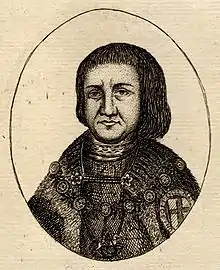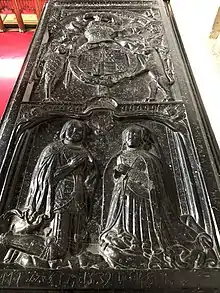John de Vere, 15th Earl of Oxford
John de Vere, 15th Earl of Oxford, Lord Great Chamberlain KG PC (c. 1482 – 21 March 1540)[1] was an English peer and courtier.[2]
John de Vere | |
|---|---|
| 15th Earl of Oxford | |
 John de Vere, 15th Earl of Oxford, engraving after funerary monument, National Portrait Gallery, London | |
| Born | c. 1482 |
| Died | 21 March 1540 Wakes Colne, Essex |
| Noble family | De Vere |
| Spouse(s) | Christian Foderingey Elizabeth Trussell |
| Issue
John de Vere, 16th Earl of Oxford Aubrey Vere Robert Vere Geoffrey Vere Elizabeth Vere Frances Vere Anne Vere | |
| Father | John de Vere |
| Mother | Alice Kilrington |

Career
John de Vere, born about 1482, was the son of John de Vere and Alice Kilrington (alias Colbroke), and the great-grandson of Richard de Vere, 11th Earl of Oxford,[3] succeeding his second cousin, John de Vere, 14th Earl of Oxford, in the earldom.[4] De Vere had two stepbrothers, William Courtenay and Walter Courtenay, and a stepsister, Katherine Courtenay, by his mother's second marriage, before 1491, to Sir Walter Courtenay (d. 7 November 1506), a younger son of Sir Philip Courtenay of Powderham, Devon, by Elizabeth Hungerford.[5]
De Vere was an Esquire of the Body at the funeral of Henry VII in 1509,[6] and was knighted by Henry VIII 25 September 1513 at Tournai, following the Battle of the Spurs.[7] He attended Henry VIII at the Field of the Cloth of Gold in 1520, and at his meeting with the Holy Roman Emperor, Charles V, at Dover in 1522.[8]
On 19 December 1526 Oxford was appointed Lord Great Chamberlain for life and was made a Knight of the Garter on 21 October 1527. He signed the Lords' petition against Cardinal Wolsey on 1 December 1529,[9] and was appointed to the Privy Council before 22 March 1531.[8]
In 1531 it was reported from Venice that Oxford was 'a man of valour and authority ... and it is his custom always to cavalcade with two hundred horse'.[9]
Oxford bore the crown at Queen Anne Boleyn's coronation in April 1533, but later served on the commission which tried the Queen on 15 May 1536.[8] On 15 October 1537 he attended the christening of the future King Edward VI, and on 12 November following was present at the funeral of Queen Jane Seymour.[8]
On 2 and 3 December 1538 Oxford served on the panel of peers at the treason trials of the Marquess of Exeter, and Lord Montagu.[8]
Oxford and his son, John, were in the King's retinue at the reception of Anne of Cleves at Blackheath.[8]
Oxford was reputedly the first Protestant earl of Oxford. He patronised a company of players for which he commissioned John Bale to write plays from 1534 to 1536.[10] As Lord Great Chamberlain and a favourite of Henry VIII, about 1537 he directed Bale to write anti-Catholic propaganda plays for Richard Morison's campaign against the Pope.[11]

Oxford died 21 March 1540 at his manor of Colne, Essex and was buried on 12 April at Castle Hedingham.[12]
Marriages and issue
Oxford married firstly, Christian Foderingey (b. circa 1481, d. before 4 November 1498),[1] the daughter of Thomas Foderingey (circa 1446–1491) of Brockley, Suffolk,[13] by Elizabeth Doreward (c. 1473–1491), daughter of William Doreward of Bocking, Essex.[13] There were no issue of the marriage.
Oxford married secondly, Elizabeth Trussell, the daughter of Edward Trussell (c. 1478 – 16 June 1499) of Kibblestone, Staffordshire and Margaret Don, the daughter of Sir John Don (d. 1503) by Elizabeth Hastings (d. 1508).[14] They had four sons and three daughters:[2]
- Elizabeth de Vere (b. circa 1512), who married Thomas Darcy, 1st Baron Darcy of Chiche (d. 28 June 1558), and had issue.[15]
- John de Vere, 16th Earl of Oxford (1516 – 3 August 1562), who married firstly, Dorothy Neville, daughter of Ralph Neville, 4th Earl of Westmorland, and secondly, Margery Golding, and had issue by both wives.
- Frances de Vere (c. 1517 – 30 Jun 1577), who married firstly, Henry Howard, Earl of Surrey, by whom she was the mother of Thomas Howard, 4th Duke of Norfolk, and secondly, Thomas Stainings.[1]
- Aubrey de Vere, who married Margaret Spring, the daughter of Sir John Spring; their grandson, Robert de Vere, became 19th Earl of Oxford.[16] Their daughter, Anne de Vere (d.1617), married, firstly Christopher Shernborne (d. 7 July 1575), by whom she had a son, Francis Shernborne, esquire, and secondly John Stubbs, whose right hand was cut off on 3 November 1579 for his authorship of The Discovery of a Gaping Gulf which criticized Queen Elizabeth's proposed marriage to Francois, Duke of Alençon.[17][18]
- Robert de Vere (b. circa 1520 – 28 April 1598), lord of the manor of Wricklemarsh, buried at Charlton, St Lukes, Kent.[19]
- Anne de Vere, (b. circa 1522, died c. 14 February 1572), who married firstly, Edmund Sheffield, 1st Baron Sheffield (d. 31 July 1549) of Butterwick, Lincolnshire, and secondly, John Brock of Colchester, Essex.[20]
- Geoffrey de Vere (b. circa 1523), who married Elizabeth Hardkyn, daughter of Sir John Hardkyn.
Ancestry
| Ancestors of John de Vere, 15th Earl of Oxford | ||||||||||||||||||||||||||||||||||||||||||||||||||||||||||||||||||||||||||||||||||||||||||||||||||||||||||||||||||||||||||||||||||||||||||||||||||||||||||||||||||||||||||||||||||||||||||||||||||||||||||||||||||||||||||||||||||||||
|---|---|---|---|---|---|---|---|---|---|---|---|---|---|---|---|---|---|---|---|---|---|---|---|---|---|---|---|---|---|---|---|---|---|---|---|---|---|---|---|---|---|---|---|---|---|---|---|---|---|---|---|---|---|---|---|---|---|---|---|---|---|---|---|---|---|---|---|---|---|---|---|---|---|---|---|---|---|---|---|---|---|---|---|---|---|---|---|---|---|---|---|---|---|---|---|---|---|---|---|---|---|---|---|---|---|---|---|---|---|---|---|---|---|---|---|---|---|---|---|---|---|---|---|---|---|---|---|---|---|---|---|---|---|---|---|---|---|---|---|---|---|---|---|---|---|---|---|---|---|---|---|---|---|---|---|---|---|---|---|---|---|---|---|---|---|---|---|---|---|---|---|---|---|---|---|---|---|---|---|---|---|---|---|---|---|---|---|---|---|---|---|---|---|---|---|---|---|---|---|---|---|---|---|---|---|---|---|---|---|---|---|---|---|---|---|---|---|---|---|---|---|---|---|---|---|---|---|---|---|---|
| ||||||||||||||||||||||||||||||||||||||||||||||||||||||||||||||||||||||||||||||||||||||||||||||||||||||||||||||||||||||||||||||||||||||||||||||||||||||||||||||||||||||||||||||||||||||||||||||||||||||||||||||||||||||||||||||||||||||
Notes
- Richardson II 2011, p. 327.
- Biography of "John De VERE (15th E. Oxford)" on tudorplace.com
- Cokayne 1945, p. 245; Richardson II 2011, p. 327.
- . Dictionary of National Biography. London: Smith, Elder & Co. 1885–1900.
- Richardson II 2011, pp. 30, 327.
- Cokayne 1945, p. 245.
- Cokayne 1945, pp. 245–6.
- Cokayne 1945, p. 246.
- Hughes 2004.
- Lancashire, Ian. Dramatic Texts and Records of Britain: A Chronological Topography to 1558 (Toronto, 1984) p. 407.
- Lancashire 1984 pp. xxviii, 64.
- Cokayne 1945, p. 247.
- Cokayne 1945, p. 247; Richardson II 2011, p. 327.
- Cokayne 1945, p. 247; Richardson II 2011, pp. 327, 370.
- Cokayne 1916, p. 78.
- Anderson 1993, p. 141; Betterton & Dymond 1989, p. 51.
- Berry 1968, p. xxiv.
- Smethdon Hundred: Shernbourn', An Essay towards a Topographical History of the County of Norfolk: volume 10 (1809), pp. 350–361 Retrieved 27 April 2013.
- Henry Vane, 'Historical Memoir on Charlton', Gentleman's Magazine (May 1865), p. 584.
- Richardson IV 2011, pp. 18–19.
References
- Anderson, Verily (1993). A Genealogical and Heraldic History of the Extinct and Dormant Baronetcies of England. Lavenham, Suffolk: Terence Dalton Limited. p. 141.CS1 maint: ref=harv (link)
- Berry, Lloyd E., ed. (1968). John Stubbs's Gaping Gulf with Letters and Other Relevant Documents. Charlottesville: University Press of Virginia. p. xxiv.CS1 maint: ref=harv (link)
- Betterton, Alec; Dymond, David (1989). Lavenham; Industrial Town. Lavenham, Suffolk: Terence Dalton Limited. p. 51.CS1 maint: ref=harv (link)
- Cokayne, George Edward (1916). The Complete Peerage, edited by Vicary Gibbs. IV. London: St. Catherine Press.CS1 maint: ref=harv (link)
- Cokayne, George Edward (1945). The Complete Peerage, edited by H.A. Doubleday. X. London: St. Catherine Press.CS1 maint: ref=harv (link)
- Hughes, Jonathan (2004). "Vere, John de, sixteenth earl of Oxford (1516–1562)". Oxford Dictionary of National Biography (online ed.). Oxford University Press. doi:10.1093/ref:odnb/28216. (Subscription or UK public library membership required.)
- Richardson, Douglas (2011). Everingham, Kimball G. (ed.). Magna Carta Ancestry: A Study in Colonial and Medieval Families. II (2nd ed.). Salt Lake City. ISBN 978-1449966386.
- Richardson, Douglas (2011). Everingham, Kimball G. (ed.). Magna Carta Ancestry: A Study in Colonial and Medieval Families. IV (2nd ed.). Salt Lake City. ISBN 978-1460992708.
| Peerage of England | ||
|---|---|---|
| Preceded by John de Vere |
Earl of Oxford 1526–1539 |
Succeeded by John de Vere |